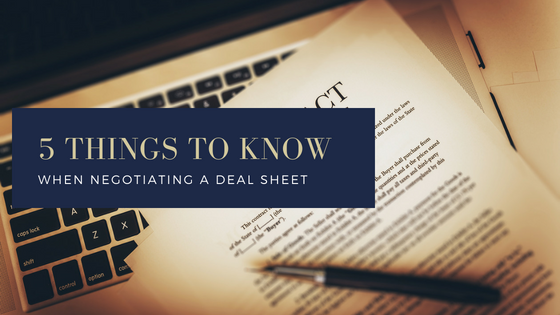5 Things To Know When Negotiating a Deal Sheet
Continuing my birthday-month blog series, this week, we'll go over the negotiating a Deal Sheet.
Also known as the Offer Letter, the Deal Sheet is the first step in your negotiation of a publishing contract. It is usually a one-page document attached to an email, or embedded into the email, detailing what the publisher is offering to publish the work. It is generally received after a phone conversation between the agent and the acquisitions editor (or the acquisition editor and the author) where the deal points are discussed.
Deal sheets are not a contract but they are generally a viable offer that a publisher has put on paper for the agent to take to the author and/or approve/reject on the author’s behalf. It details general points (deal points) that the publisher is willing to offer the author in exchange for the right to publish the work. It’s important to understand and review these points well before agreeing to them as these are generally the first opportunity you have to negotiate with the publisher.
If you don’t already have an agent who will negotiate the contract for you, or if you feel comfortable negotiating with a publisher on your own, here are a few things to remember before sitting down at the negotiation table:
Resources:
- How to Be Your Own Literary Agent by Richard Curtis
- "Negotiating With a Book Publisher: 7 Deal Points to Confirm Before You Sign On The Dotted Line"
Also known as the Offer Letter, the Deal Sheet is the first step in your negotiation of a publishing contract. It is usually a one-page document attached to an email, or embedded into the email, detailing what the publisher is offering to publish the work. It is generally received after a phone conversation between the agent and the acquisitions editor (or the acquisition editor and the author) where the deal points are discussed.
Deal sheets are not a contract but they are generally a viable offer that a publisher has put on paper for the agent to take to the author and/or approve/reject on the author’s behalf. It details general points (deal points) that the publisher is willing to offer the author in exchange for the right to publish the work. It’s important to understand and review these points well before agreeing to them as these are generally the first opportunity you have to negotiate with the publisher.
If you don’t already have an agent who will negotiate the contract for you, or if you feel comfortable negotiating with a publisher on your own, here are a few things to remember before sitting down at the negotiation table:
- Negotiation is a dance of give and take. Set in your mind the rigid limits you’ll allow to be pushed before walking away from the table. What’s your deal-breaker? Keep that in the forefront of your mind.
- Do your homework. This is something you can do now. Subscribe to industry newsletters in your genre, consult with agents and other writers about the industry standard royalty rates. Ask other writers about their experience signing with their current publisher.
- Assume everything is negotiable. While one or two things can be non-negotiable in a contract, chances are 90% of what’s presented to you is negotiable. Doesn’t hurt to ask for everything and leave the room with more than you walked in with.
- While on the phone, don’t argue the small stuff and on paper, keep your tone professional instead of combative. Make a strong argument for what you want but since you’re likely not a bestselling author about to take your millions in earnings elsewhere, be aware of your lack of leverage at this point and arm yourself with knowledge about the industry (see #2 above). Propose counteroffers that are not insulting to the publisher or to your wallet.
- Ask for it in writing. Once the conversation is over, ask again for the revised deal sheet to be emailed to you. It should include everything you discussed in person or via phone.
Resources:
- How to Be Your Own Literary Agent by Richard Curtis
- "Negotiating With a Book Publisher: 7 Deal Points to Confirm Before You Sign On The Dotted Line"





Comments
Post a Comment